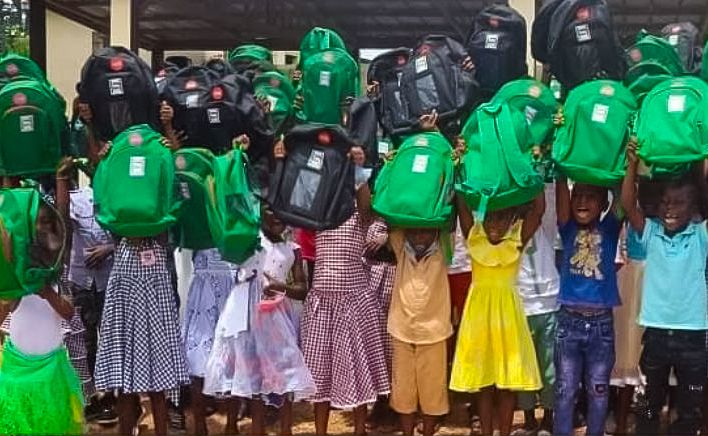14-year-old Xolile Masango from Macetjeni in eastern Lubombo in the kingdom of Eswatini wants to be a doctor when she grows up so she could treat her sickly father.
She also wants to be able to provide healthcare to her community.
Born into a family of three children, her parents make a living from ploughing and weeding the local fields, but their combined wages aren’t enough to put food on the table, let alone buy electricity.
Masango is one of many Swati girls who can’t study after dusk and are therefore less likely to graduate and get jobs that can help pull their families out of poverty.
Studying for tests and doing assignments at home is not possible for the teenage girl and her siblings.
“Sometimes I try finishing my homework at school but it’s difficult because the timetable is full of lessons and there’s no free time. When I go home with them, I still have my chores to do, and by the time I finish it’s dark, and we don’t have light. Waking up early doesn’t help either because there’s just not enough time when you’re trying to get ready for school,” she said.
Temasiko Dlamini, who teaches Grade 4 and 5 pupils at Siteki Nazarene Primary School, agrees that many of her pupils face challenges in their academic journeys and that most come from disadvantaged backgrounds.
“I have had many of my pupils fail to submit their homework on time and fail to perform to the best of their abilities in tests because they just don’t have the means to study ahead of any academic assessment. This, therefore, impacts on their overall performance,” she said.
The fact that these pupils come from homes with no lighting, which affects their academic progress, is a concern that needs to be properly looked into, added Dlamini.
35-year-old Celani Matsenjwa is doing just that.
Recognizing the plight of school children in his community, he has rallied like-minded individuals to form FoodQuest Eswatini. This local food bank not only secures surplus and unsaleable food and makes it available to those who need it but also provides solar backpacks to school children.
“Seeing so many schoolchildren either carrying their books under their armpits or using plastic bags, unsettled me. So in the 2022 academic year, I started this project which kills two birds with one stone,” Matsenjwa explained.
Matsenjwa said that apart from the bag and food problem, some school children have no reliable light source back home since their homes have no access to the national grid, while others can’t afford the high electricity costs.
“Most of them have never owned a school bag nor have a reliable source of light back home to do their homework during the night,” he said.
According to Matsenjwa, the backpacks they provide solve this problem since they have a solar panel, an in-built battery, and a light. The solar panel recharges the battery during the day.
“The total irradiation reaching the solar panel while the kids journey to school in the morning and back home is enough to recharge the inbuilt battery and can give ample light for up to five hours,” he explained.
Matsenjwa said the organization currently buys the solar backpacks from China, for 450 rand (US$25) each. Scaling up would help to bring down the costs.
“We’ve donated these bags to schools including Mphundle Primary, Kumenini Primary, Sitsatsaweni Primary and Ndlalane Primary,” he said.
FoodQuest partners with the corporate community to build on the initiative.
“Companies buy these bags on behalf of the kids through their CSI programmes, and they get international recognition through Food Quest Eswatini,” he said.
Nosipho Dlamini, a social worker at Hosea’s Heart, which partners with FoodQuest Eswatini, said the backpacks were making a difference.
“Their lives will be improved as they will be able to focus on their dreams without making excuses of not finishing their work at home because they have lights provided for and food supplied often,” she said.
With small strides such as these, FoodQuest remains resolute in its quest to bring lights to help children study at home and develop their full potential to become the leaders of tomorrow.
While Xolile Masango is yet to be a recipient of this initiative, she hopes that FoodQuest Eswatini will soon reach her.
bird story agency
14-year-old Xolile Masango from Eswatini aspires to be a doctor to treat her ailing father and provide healthcare to her community. Born into a low-income family reliant on ploughing and weeding local fields, Masango struggles with her studies due to the lack of electricity at home. Like many other Swati children, she faces challenges in completing homework and studying after dark.
The academic difficulties of students from deprived backgrounds due to a lack of resources such as lighting were highlighted by primary school teacher Temasiko Dlamini. To address these issues, 35-year-old Celani Matsenjwa founded FoodQuest Eswatini, which not only distributes food but also provides solar backpacks to students. These backpacks, equipped with a solar panel, in-built battery, and light, help students study in the evenings by providing reliable lighting.
The backpacks are purchased from China at 450 rand each and distributed to several local primary schools with the help of corporate sponsors. Social worker Nosipho Dlamini from Hosea’s Heart attested to the significant positive impact these backpacks have on children’s lives, helping them focus on their education without the barrier of inadequate lighting.
FoodQuest remains committed to supporting the educational aspirations of children like Xolile Masango and aims to expand its reach.






